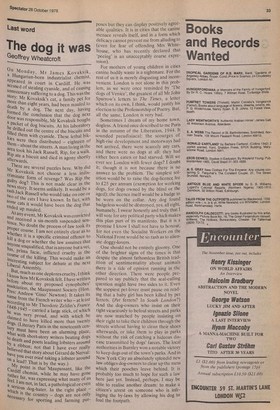Last wor d
The dog it was
Geoffrey Wheatcroft
On Monday, Mr James Kovaksik, a Hungarian-born industrialist chemist, appeared in court in Cardiff. Fle was accused of stealing cyanide, and of causing unnecessary suffering to a dog. This was the storY: Mr Kovaksik's cat, a family pet for more than eight years, had been mauled to death by a dog. The next day, having formed the conclusion that the dog next door was responsible, Mr Kovaksik bought a packet of dog biscuits. At his laboratory he drilled out the centre of the biscuits and filled them with cyanide. These lethal bik; kites were then distributed — eighteen o_ them_ about the streets. A man living in the area took his Jack Russell, Rip, for a walk. Rip ate a biscuit and died in agony shortly afterwards. There are several puzzles here. Why did Mr Kovaksik not choose a less indiscriminate inate form of revenge? Was Rip the guilty dog? This is not made clear in the news story. It seems unlikely. It would be a rash Jack Russell who would take on one or two of the cats I have known. In fact, with some cats it would have been the dog that ended up mauled. At any event, Mr Kovaksik was convicted and received a six-month suspended sentence. No doubt the process of law took its Proper course. I am not entirely clear as to Whether it is a specific criminal offence to loll a dog or whether the law assumes that a. nyone unqualified, that is anyone but a vet, has, prima facie, inflicted cruelty in the eourse of the killing. This would make an interesting subject for debate at the next Liberal Assembly. Rut, much as one deplores cruelty, I think I know how Mr Kovaksik felt. I have written before about my proposed cynophobes, assdciation, the Maupassant Society (Hon. Pres: Andrew 'Gino' Newton). It takes its name from the French writer who — at least !ecording to Mr Theodore Zeldin's Franee 1848-1945 — carried a large stick, of which was very proud, and with which he claimed to have killed more than twenty .aogs. (Literary Paris in the nineteenth cen tury must have been an alarming place, What with short-story writers beating dogs 10 death and poets leading lobsters around ,I3Y a ribbon; not that I have ever really .eved that story about Gerard de Nerval: naVe you ever tried taking a lobster around on a lead? That is by the way.) My point is that Maupassant, like the Cardiff chemist, while he may have gone rather far, was expressing what many of us 1,1. I am not, in fact, a pathological or even SFr10Us 6 do- hater. In the right place — which is the country — dogs are not ,only necessary for sporting and farming Pur poses but they can display positively agreeable qualities. It is in cities that the canine menace reveals itself, and in a form which delicacy cannot prevent me from alluding to (even for fear of offending Mrs Whitehouse, who has recently declared that 'peeing' is an unacceptably coarse expression). For mothers of young children in cities canine bodily waste is a nightmare. For the rest of us it is merely disgusting and inconvenient. London is not alone in this problem, as we were once reminded by The dogs of Venice', the greatest of all Mr John Sparrow's letters to The Times, a letter which on its own, I think, would justify his election to the Professorship of Poetry. But, all the same, London is very bad. ,Sometimes I dream of my home town, dogless. A friend once described to me Paris in the autumn of the Liberation, 1944. It sounded paradisiacal: the scourges of high-rise development and motorways had not arrived, there were scarcely any cars, and there were no dogs at all: they had either been eaten or had starved. Will we ever see London with fewer dogs? I doubt it; though it is not because there is no answer to the problem. The simplest solution would be to raise the dog-licence fee to £25 per annum (exemption for working dogs, for dogs owned by the blind or the aged); the licence itself would be a badge to be worn on the collar. Any dog found badgeless would be destroyed, yes, all right, humanely. I swear honestly and truly that I will vote for any political party which makes this plan part of its manifesto. But it is a promise I know I shall not have to honour, for not even the Socialist Workers on the National Front would be so rash as to alienate doggy-lovers. One should not be entirely gloomy. One of the brighter signs of the times is that despite the almost fathomless British tradition of sentimentality about animals there is a tide of opinion running in the other direction. There were people prepared to say publicly that the seal-culling question might have two sides to it. Even the soppiest pet-lover must pause on reading that a baby girl has been killed by pet ferrets. (Pet ferrets? In South London?) And the dog-owners who insist on their right vicariously to befoul streets and parks are now matched by people insisting on their right to take their children through the streets without having to clean their shoes afterwards, or take them to play in parks without the risk of catching a hideous disease transmitted by dogs' faeces. The local authorities in Burnley won a notable victory to keep dogs out of the town's parks. And in New York City an absolutely splendid new law obliges dog-owners to clear up the mess which their pooches leave behind. It is probably too much to hope for such a law here just yet. Instead, perhaps, I may be able to realise another dream: to make a citizen's arrest on someone who is infringing the by-laws by allowing his dog to foul the footpath.






































 Previous page
Previous page